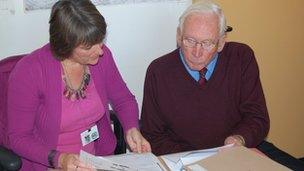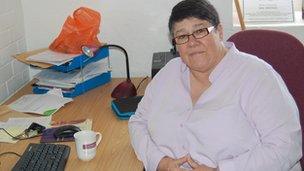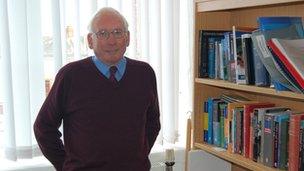Community justice: The power of the panel
- Published

Volunteers are briefed on the case before they attend a panel
"I could feel the tension and hatred when they came into the room - but three quarters of an hour later there were buckets of tears."
John Gallagher describes a neighbour dispute which had run for seven years and descended into an anti-social behaviour case.
It was finally brought to an end in a guildhall in South Somerset through a community justice panel.
He says: "When they heard what effect their actions had on each other the tears came and then the hugs and an invitation to a barbecue that evening.
"It was not solved by me but by restorative justice."
'Bring Justice Home'
South Somerset Community Justice Panel has been going for eight years.
Similar panels have been tried out in Sheffield and Norfolk and the government recently announced another 15 areas would pilot their own neighbourhood justice schemes.
Leafy Somerset, in the heart of the west country, might seem an odd place for a pioneering justice model.
But it was two major crimes which lead to the setting up of the panel as a way to bring justice back to the town's residents.
The scheme's manager, Val Keitch, says: "There were two murders which were quite high profile and although Chard isn't inner city Birmingham or Manchester the perception was crime was happening and there was nothing happening about it.
"It was 18 miles to the nearest magistrates' court so the local newspaper ran a campaign called Bring Justice Home to try to get the court reopened which had closed the year before."
When it was decided reopening the court was not feasible the community turned to the restorative justice model - a method of justice designed to deal with a variety of offences in the community and involve residents and victims in the process.

Val Keitch said the panels differed from the magistrates' court
Typical offences include criminal damage, assault and race crimes.
Volunteers, who are called facilitators, are trained to oversee meetings between victims and offenders. Both parties are invited to bring along a supporter, typically a friend or family member.
Offenders must have admitted their offence before they are referred to the scheme by an agency such as the police or a housing association.
At the panel they are asked a number of questions about the offence they committed before the victim is given the chance to talk about how the crime has affected them.
At the end of a meeting the offender must sign an acceptable behaviour contract which contains any agreements around reparation such as paying back a monetary amount or doing community work.
If the contract is breached the matter can be referred back to the panel or to the referring agency.
So far this year the panel has dealt with 44 offences, last year it dealt with 98.
Mr Gallagher, who is also one of the panel's trustees, got involved from the scheme's start.
He said: "The reason I became a volunteer is because I had done so much complaining saying that nothing was being done about anti-social behaviour.
"When people began to do something about it there was no way I couldn't get involved and I haven't regretted one moment."
Mr Gallagher has personally been involved in 150 cases including the neighbourhood dispute which began as a disagreement over parking and rights of way.
He said the resolution in the meeting had seemed too good to be true prompting him to ring one of the parties two weeks later.
No criminal record
"They said 'life has never been so good' which felt very rewarding," he said.

John Gallagher said he felt compelled to volunteer after complaining about anti-social behaviour
For Ms Keitch, who has worked in the prison and probation service, the panel has two key differences to court.
"Its very easy to stand in court and plead guilty and know your punishment is probably not going to be too onerous but you're not taking responsibility and where does the victim sit?
"There might be a victim impact statement which someone reads out but there is no emotion."
The panel also differs in that the offence does not appear on the person's criminal record.
And it is quick - a case can go from referral to panel in two to three weeks while on average nearly five months pass between an offence taking place and a sentence being handed down in the courts, despite the fact that most cases do not have to go to trial or are uncontested.
According to Ms Keitch the panel is also cheaper: "The basic cost for police and the CPS of taking a criminal damage case through court is £637, through the panel it costs £139."
While news about more panels being launched has been cautiously welcomed by victims' charities some have expressed concern that "Justice rushed is justice denied".
Greg Foxsmith, a solicitor and legal commentator, has previously said he was worried a speedier and swifter process might lead to a loss of justice.
But whether about speedy justice, dealing with crime on a shoestring or giving the victim a voice, with the Ministry of Justice backing the model, neighbourhood justice schemes could be coming to a town near you soon.
- Published11 October 2012
- Published13 July 2012